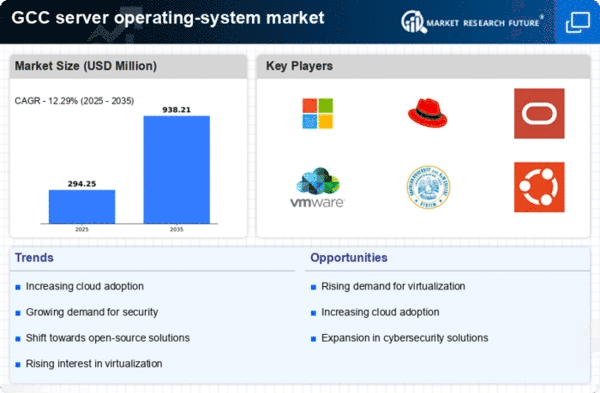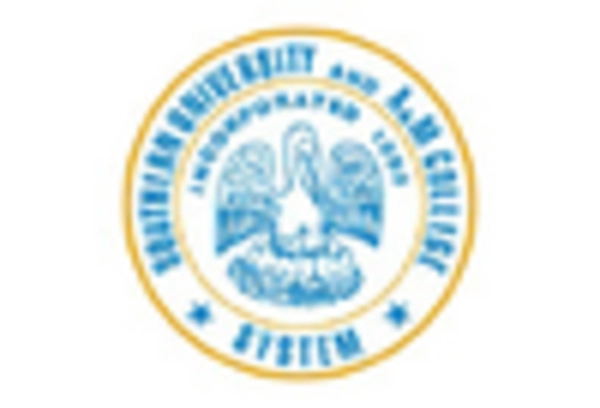Increased Focus on Cybersecurity
In the context of the server operating-system market, the rising emphasis on cybersecurity is a critical driver. With the increasing frequency of cyber threats, organizations in the GCC are prioritizing the security of their IT environments. This has led to a growing demand for server operating systems that incorporate advanced security features, such as intrusion detection systems and enhanced encryption protocols. Recent statistics indicate that cybersecurity spending in the region is expected to reach $30 billion by 2026, reflecting a significant investment in protective measures. Consequently, server operating-system vendors are compelled to innovate and integrate robust security functionalities into their offerings, ensuring that businesses can safeguard their data and maintain compliance with regulatory standards. This heightened focus on cybersecurity is likely to shape the competitive landscape of the server operating-system market.
Rising Demand for Virtualization
The server operating-system market is experiencing a notable increase in demand for virtualization technologies. Organizations in the GCC are increasingly adopting virtualization to optimize resource utilization and reduce operational costs. This trend is driven by the need for efficient management of IT resources, as virtualization allows multiple virtual servers to run on a single physical server. According to recent data, the virtualization segment is projected to grow at a CAGR of approximately 15% over the next five years. This growth is indicative of a broader shift towards more agile and scalable IT infrastructures, which is essential for businesses aiming to enhance their operational efficiency. As a result, the server operating-system market is likely to see a surge in solutions that support virtualization capabilities, catering to the evolving needs of enterprises in the region.
Growing Interest in Containerization
The server operating-system market is increasingly influenced by the growing interest in containerization technologies. Organizations in the GCC are recognizing the advantages of containerization, which allows for the deployment of applications in isolated environments, enhancing scalability and resource efficiency. This trend is supported by the rising adoption of microservices architectures, which facilitate the development and deployment of applications in a more agile manner. Data indicates that the containerization market is expected to grow at a CAGR of approximately 25% over the next few years. Consequently, server operating-system vendors are likely to enhance their offerings to support container orchestration and management, thereby catering to the needs of businesses looking to modernize their application deployment strategies. This growing interest in containerization is poised to reshape the server operating-system market landscape.
Shift Towards Hybrid IT Environments
The server operating-system market is witnessing a shift towards hybrid IT environments, where organizations blend on-premises infrastructure with cloud services. This trend is particularly pronounced in the GCC, as businesses seek to leverage the benefits of both models. Hybrid environments offer flexibility, scalability, and cost-effectiveness, allowing organizations to optimize their IT resources based on specific needs. Data suggests that the hybrid cloud market is expected to grow at a CAGR of around 20% in the coming years. As a result, server operating-system providers are increasingly focusing on developing solutions that seamlessly integrate with both on-premises and cloud infrastructures. This evolution is likely to drive innovation within the server operating-system market, as vendors strive to meet the demands of organizations transitioning to hybrid models.
Regulatory Compliance and Data Sovereignty
In the server operating-system market, regulatory compliance and data sovereignty are becoming increasingly significant drivers. Organizations in the GCC are facing stringent regulations regarding data protection and privacy, necessitating the adoption of server operating systems that ensure compliance with local laws. The need for data sovereignty, which mandates that data must be stored and processed within specific geographical boundaries, is particularly relevant in this region. As a result, server operating-system vendors are compelled to adapt their solutions to meet these regulatory requirements. Recent reports indicate that compliance-related investments in the GCC are projected to exceed $10 billion by 2025. This focus on regulatory compliance is likely to influence the development and marketing strategies of server operating-system providers, as they seek to offer solutions that align with the evolving legal landscape.
















